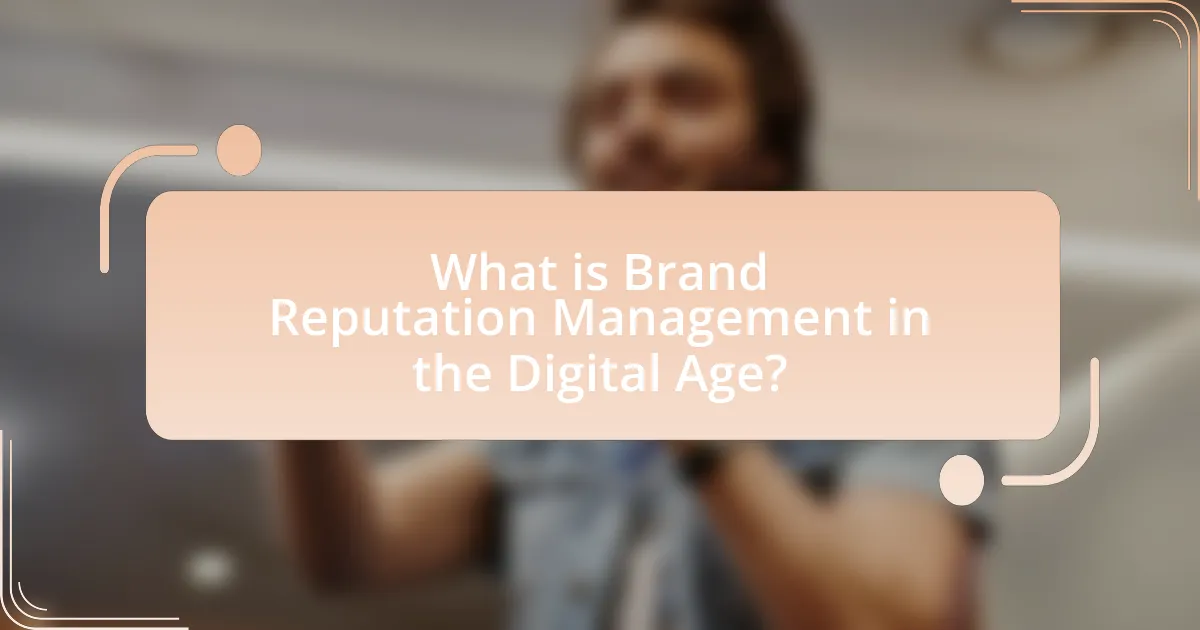Brand Reputation Management in the Digital Age encompasses the strategies organizations use to monitor and influence their online reputation. The article highlights the critical importance of maintaining a positive brand image in a digital landscape where consumer trust is paramount, with 81% of consumers requiring trust before making purchases. Key elements of effective reputation management include online presence, customer feedback, social media engagement, and transparency. The article also discusses the impact of online platforms on brand perception, the significance of addressing negative feedback, and best practices for monitoring and enhancing brand reputation, including the use of sentiment analysis and proactive communication strategies.

What is Brand Reputation Management in the Digital Age?
Brand Reputation Management in the Digital Age refers to the strategies and practices that organizations employ to monitor, influence, and maintain their reputation online. In today’s digital landscape, where information spreads rapidly through social media and online reviews, managing brand reputation has become critical for businesses. According to a 2021 survey by Edelman, 81% of consumers stated that they must be able to trust the brand to buy from them, highlighting the importance of a positive online presence. Effective brand reputation management involves actively engaging with customers, addressing negative feedback promptly, and promoting positive content to shape public perception.
How has the digital landscape changed brand reputation management?
The digital landscape has transformed brand reputation management by enabling real-time communication and feedback between brands and consumers. This shift allows brands to monitor public perception instantly through social media, online reviews, and digital forums, which can significantly influence consumer behavior. For instance, a 2021 survey by Sprout Social found that 70% of consumers are more likely to support a brand that actively engages with them on social media. Additionally, the rise of online platforms has made it easier for negative information to spread rapidly, necessitating proactive reputation management strategies. Brands now utilize tools like sentiment analysis and social listening to gauge public opinion and respond swiftly to potential crises, thereby maintaining their reputation in a fast-paced digital environment.
What are the key elements of brand reputation in the digital context?
The key elements of brand reputation in the digital context include online presence, customer feedback, social media engagement, and transparency. Online presence refers to how a brand is represented across various digital platforms, influencing public perception. Customer feedback, particularly through reviews and ratings, significantly impacts brand reputation, as 93% of consumers read online reviews before making a purchase decision. Social media engagement allows brands to interact directly with customers, fostering trust and loyalty. Transparency, especially regarding business practices and communication, is crucial, as 86% of consumers expect brands to be open about their operations. These elements collectively shape how a brand is perceived in the digital landscape.
How do online platforms influence brand perception?
Online platforms significantly influence brand perception by shaping consumer opinions through user-generated content, reviews, and social media interactions. These platforms serve as primary sources of information where potential customers evaluate brands based on the experiences shared by others. For instance, a study by BrightLocal in 2022 found that 87% of consumers read online reviews for local businesses, indicating that positive or negative feedback can directly impact a brand’s reputation. Additionally, social media engagement allows brands to communicate directly with consumers, fostering a sense of community and trust, which can enhance brand loyalty. Thus, the presence and activity of a brand on online platforms are crucial in determining how it is perceived by the public.
Why is brand reputation management crucial for businesses today?
Brand reputation management is crucial for businesses today because it directly influences consumer trust and purchasing decisions. In a digital landscape where information spreads rapidly, a positive brand reputation can lead to increased customer loyalty and higher sales, while a negative reputation can result in significant financial losses. For instance, a study by the Harvard Business Review found that a one-star increase in a restaurant’s Yelp rating can lead to a 5-9% increase in revenue. Therefore, effective brand reputation management is essential for maintaining competitive advantage and ensuring long-term business success.
What impact does brand reputation have on consumer trust?
Brand reputation significantly influences consumer trust, as a positive reputation fosters confidence in a brand’s reliability and quality. Research indicates that 84% of consumers are more likely to trust a brand with a strong reputation, as it signals credibility and ethical practices. Furthermore, brands with favorable reputations often experience increased customer loyalty and higher sales, demonstrating that reputation directly correlates with consumer trust levels.
How can a strong brand reputation drive business growth?
A strong brand reputation drives business growth by fostering customer trust and loyalty, which leads to increased sales and market share. When consumers perceive a brand positively, they are more likely to choose its products or services over competitors, resulting in higher conversion rates. For instance, a study by Nielsen found that 59% of consumers prefer to buy new products from brands familiar to them, highlighting the impact of brand reputation on purchasing decisions. Additionally, a positive reputation can reduce marketing costs, as satisfied customers often become brand advocates, promoting the brand through word-of-mouth and social media, further enhancing visibility and attracting new customers.

What are the best practices for managing brand reputation online?
The best practices for managing brand reputation online include actively monitoring online mentions, responding promptly to customer feedback, and maintaining a consistent brand voice across all platforms. Active monitoring allows brands to identify and address potential issues before they escalate, as studies show that 70% of consumers are influenced by online reviews. Prompt responses to both positive and negative feedback demonstrate customer care and can improve public perception. Consistency in brand messaging reinforces trust and reliability, which are crucial for maintaining a positive reputation.
How can businesses effectively monitor their brand reputation?
Businesses can effectively monitor their brand reputation by utilizing social media listening tools, online review platforms, and regular surveys to gauge public sentiment. Social media listening tools, such as Hootsuite or Brandwatch, allow companies to track mentions of their brand across various platforms, providing real-time insights into customer opinions and trends. Online review platforms like Yelp and Google Reviews enable businesses to assess customer feedback and respond promptly to concerns, which can mitigate negative perceptions. Additionally, conducting regular surveys helps gather direct feedback from customers, allowing businesses to understand their audience’s perceptions and make necessary adjustments. These methods collectively provide a comprehensive view of brand reputation, enabling proactive management and improvement.
What tools are available for tracking online brand mentions?
Tools available for tracking online brand mentions include Google Alerts, Mention, Brand24, Hootsuite, and Sprout Social. Google Alerts allows users to receive notifications for specific keywords, helping them monitor brand mentions across the web. Mention provides real-time monitoring and analytics for social media and online platforms. Brand24 offers sentiment analysis and engagement metrics, enabling brands to assess their online reputation effectively. Hootsuite integrates social media management with brand monitoring, while Sprout Social combines social listening with analytics to track brand mentions and audience engagement. These tools are widely recognized for their effectiveness in brand reputation management.
How can sentiment analysis improve reputation management strategies?
Sentiment analysis can significantly enhance reputation management strategies by providing real-time insights into public perception. By analyzing customer feedback, social media interactions, and online reviews, organizations can identify positive and negative sentiments associated with their brand. This data allows companies to proactively address issues, improve customer satisfaction, and tailor their communication strategies. For instance, a study by the Harvard Business Review found that companies using sentiment analysis to monitor brand perception saw a 20% increase in customer retention rates. This demonstrates that leveraging sentiment analysis not only helps in mitigating potential reputational risks but also fosters stronger relationships with customers.
What strategies can be implemented to enhance brand reputation?
To enhance brand reputation, companies can implement strategies such as proactive communication, customer engagement, and transparency. Proactive communication involves regularly updating stakeholders about company initiatives and responding promptly to inquiries, which builds trust. Customer engagement through social media and feedback channels fosters a sense of community and loyalty, as seen in brands like Nike, which actively interacts with customers online. Transparency in operations and decision-making, exemplified by companies like Patagonia, reinforces credibility and aligns brand values with consumer expectations. These strategies collectively contribute to a positive brand image and increased customer trust.
How can engaging with customers on social media improve brand image?
Engaging with customers on social media can significantly improve brand image by fostering trust and loyalty. When brands actively interact with their audience, they demonstrate transparency and responsiveness, which are critical factors in building a positive perception. According to a study by Sprout Social, 70% of consumers feel more connected to a brand when the brand engages with them on social media. This connection often leads to increased customer loyalty and advocacy, enhancing the overall brand image. Furthermore, consistent engagement allows brands to address customer concerns promptly, mitigating potential negative feedback and reinforcing a positive reputation.
What role does content marketing play in reputation management?
Content marketing plays a crucial role in reputation management by shaping public perception and building trust with the audience. Through the creation and dissemination of valuable, relevant content, brands can establish authority in their industry, address customer concerns, and engage with their audience effectively. For instance, a study by the Content Marketing Institute found that 70% of consumers prefer to learn about a company through articles rather than advertisements, highlighting the effectiveness of content in fostering positive brand associations. By consistently delivering high-quality content, brands can mitigate negative feedback and enhance their overall reputation in the digital landscape.

What challenges do companies face in brand reputation management?
Companies face several challenges in brand reputation management, including the rapid spread of negative information, difficulty in monitoring online sentiment, and the impact of social media. The speed at which information travels online can lead to reputational crises that escalate quickly, often before companies can respond effectively. Additionally, monitoring tools may not capture the full scope of public sentiment, making it hard for companies to gauge their reputation accurately. Social media platforms amplify both positive and negative feedback, complicating the management of brand perception. According to a 2021 study by the Reputation Institute, 70% of consumers are influenced by online reviews, highlighting the critical need for companies to actively manage their online presence to mitigate these challenges.
How can negative reviews impact brand reputation?
Negative reviews can significantly damage brand reputation by influencing consumer perceptions and purchasing decisions. Research indicates that 84% of people trust online reviews as much as personal recommendations, highlighting the weight negative feedback carries. When potential customers encounter negative reviews, they may associate those experiences with the brand, leading to decreased trust and loyalty. Furthermore, a study by Harvard Business School found that a one-star increase in a restaurant’s Yelp rating can lead to a 5-9% increase in revenue, illustrating the financial impact of reputation shaped by reviews. Thus, negative reviews can erode customer confidence and ultimately harm a brand’s bottom line.
What steps can be taken to address and mitigate negative feedback?
To address and mitigate negative feedback, organizations should first acknowledge the feedback promptly and professionally. This step is crucial as it demonstrates to customers that their concerns are valued and taken seriously. Following acknowledgment, organizations should investigate the issue thoroughly to understand the context and specifics of the feedback. This investigation allows for a tailored response that addresses the root cause of the complaint.
Next, organizations should respond publicly to the feedback, providing a clear and concise explanation or resolution. This public response not only helps the individual who provided the feedback but also reassures other customers that the organization is committed to improvement. Additionally, implementing changes based on the feedback can prevent similar issues in the future, showcasing a proactive approach to customer satisfaction.
Finally, organizations should monitor ongoing feedback to identify trends and areas for improvement continuously. According to a study by the Harvard Business Review, companies that actively engage with customer feedback can improve customer retention by up to 25%. This statistic underscores the importance of addressing negative feedback effectively to enhance brand reputation and customer loyalty.
How can misinformation affect a brand’s reputation?
Misinformation can severely damage a brand’s reputation by eroding consumer trust and leading to negative perceptions. When false information circulates, it can create confusion and mislead potential customers, resulting in decreased sales and loyalty. For instance, a study by the Pew Research Center found that 64% of Americans believe that misinformation has caused significant harm to the public, which directly correlates to how consumers view brands associated with such misinformation. Additionally, brands may face backlash on social media platforms, where misinformation spreads rapidly, amplifying negative sentiments and potentially leading to a loss of market share.
What are the legal considerations in managing brand reputation?
Legal considerations in managing brand reputation include compliance with defamation laws, intellectual property rights, and consumer protection regulations. Defamation laws protect individuals and organizations from false statements that could harm their reputation; thus, brands must ensure that their communications do not inadvertently defame others. Intellectual property rights, including trademarks and copyrights, are crucial for protecting brand identity and preventing unauthorized use that could dilute reputation. Additionally, consumer protection regulations require brands to provide truthful advertising and avoid misleading claims, as violations can lead to legal repercussions and damage to reputation. These legal frameworks are essential for maintaining a positive brand image and avoiding litigation.
What laws govern online reviews and testimonials?
The laws governing online reviews and testimonials primarily include the Federal Trade Commission (FTC) guidelines, which require that endorsements and testimonials must be truthful and not misleading. The FTC mandates that businesses disclose any material connections between themselves and the reviewers, such as compensation or free products. Additionally, the Lanham Act allows businesses to sue for false advertising if a competitor’s review is misleading. These regulations ensure transparency and protect consumers from deceptive practices in online reviews.
How can companies protect themselves from defamation online?
Companies can protect themselves from defamation online by implementing a comprehensive online reputation management strategy. This includes actively monitoring online mentions, utilizing tools like Google Alerts and social media monitoring software to track brand mentions and respond promptly to negative comments. Additionally, companies should establish clear communication channels for addressing customer complaints and encourage satisfied customers to leave positive reviews, which can help counteract negative content. Legal measures, such as consulting with legal professionals to understand defamation laws and pursuing action against false statements, also play a crucial role in safeguarding a company’s reputation. According to a study by the Reputation Institute, 70% of consumers trust a brand more when they see positive online reviews, highlighting the importance of proactive reputation management.
What practical tips can businesses follow for effective brand reputation management?
Businesses can effectively manage their brand reputation by actively monitoring online mentions and engaging with customers. Regularly tracking social media platforms and review sites allows businesses to identify potential issues early. Engaging with customers through timely responses to feedback, both positive and negative, fosters trust and demonstrates commitment to customer satisfaction. Additionally, creating high-quality content that aligns with brand values can enhance public perception. According to a 2021 survey by Sprout Social, 70% of consumers are more likely to support brands that respond to their inquiries on social media, highlighting the importance of engagement in reputation management.